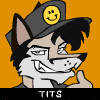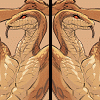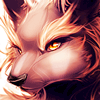
Parade Ground, 1805
Marshal Heart parading before the 13e Cuirassiers, ca. 1805
Inspired by chanrom's outstanding armor paints, and period paintings of course ;)
chanrom's outstanding armor paints, and period paintings of course ;)
Inspired by
 chanrom's outstanding armor paints, and period paintings of course ;)
chanrom's outstanding armor paints, and period paintings of course ;)
Category Artwork (Digital) / General Furry Art
Species Vulpine (Other)
Size 960 x 1280px
File Size 494.3 kB
Hail the Emperor
TO THE PRUSSIAN FRONT!
(Don't quote me on my references, I'm not a circa 1800's other than the Civil War) XP
But I was watching Waterloo recently and had you on my mind the entire time.
If there was any one who'd get tired of these astonishing pieces of gallery work, they should be shot by firing squad.
TO THE PRUSSIAN FRONT!
(Don't quote me on my references, I'm not a circa 1800's other than the Civil War) XP
But I was watching Waterloo recently and had you on my mind the entire time.
If there was any one who'd get tired of these astonishing pieces of gallery work, they should be shot by firing squad.
Well, I guess I'm your "circa 1800's" guy... Brace for my Napoleonic history nerd block of text:
In 1805, Napoleon wasn't really considering Prussia as a target, however he was probably aware that a conflict with Prussia was inevitable. During 1805, he was playing a diplomacy game with Prussia, offering French occupied Hanover to Prussia for a military alliance, though I think it was probably done more so prevent Prussia from joining the Third Coalition. The real reason for Prussia for triggering the Fourth Coalition, was that one of Napoleon's Army corps marched through the territory of Prussian controlled Ansbach (it's where the Prussian Royal Hohenzollern family originated) during the Ulm campaign, which was a violation of Prussia's neutrality. Plus, with the creation of the Confederation of the Rhine and its disregard to any Prussian territorial interests, Prussia had to make a stand or be completely eclipsed by France. War with France was extremely popular for the people and military in Prussia due to these events, but Frederick William III was actually a pacifist and really did not want war, but due to the violation of neutrality at Ansbach, he declared war on France. The big mistake with the Jena campaign was that the Prussian Army went on the offence when it should of waited for the the Russian army to arrive (i.e., basically the same mistake the Austrians made during the Ulm Campaign).
In 1805, Napoleon wasn't really considering Prussia as a target, however he was probably aware that a conflict with Prussia was inevitable. During 1805, he was playing a diplomacy game with Prussia, offering French occupied Hanover to Prussia for a military alliance, though I think it was probably done more so prevent Prussia from joining the Third Coalition. The real reason for Prussia for triggering the Fourth Coalition, was that one of Napoleon's Army corps marched through the territory of Prussian controlled Ansbach (it's where the Prussian Royal Hohenzollern family originated) during the Ulm campaign, which was a violation of Prussia's neutrality. Plus, with the creation of the Confederation of the Rhine and its disregard to any Prussian territorial interests, Prussia had to make a stand or be completely eclipsed by France. War with France was extremely popular for the people and military in Prussia due to these events, but Frederick William III was actually a pacifist and really did not want war, but due to the violation of neutrality at Ansbach, he declared war on France. The big mistake with the Jena campaign was that the Prussian Army went on the offence when it should of waited for the the Russian army to arrive (i.e., basically the same mistake the Austrians made during the Ulm Campaign).
I'll give it to you, you are indeed the man for this circa. XP
Very cool, very cool. Really fascinating stuff, thank you for running that by me. I appreciated it.
Hopefully I may thoroughly reach your point of era, cause this is indeed alluring. I am however still stuck with the First World War and the American Civil War.
But I am slowly inching my way back in time to learn these other campaigns.
Thanks again, Fusilier ^_^
Very cool, very cool. Really fascinating stuff, thank you for running that by me. I appreciated it.
Hopefully I may thoroughly reach your point of era, cause this is indeed alluring. I am however still stuck with the First World War and the American Civil War.
But I am slowly inching my way back in time to learn these other campaigns.
Thanks again, Fusilier ^_^
Well, I wouldn't really call it friendly, but certainly there was a clear hierarchy between the different types of cavalry during this time period.
The top most cavalry for the French Army in hierarchy was Napoleon's Guard Cavalry, which has its own order and distinctions (if you are curious, here's a link to a pretty good source http://napoleonistyka.atspace.com/I.....cavalry_1.html ).
After them, it was the Horse Carabiniers ,"Carabiniers-à-Cheval" though they were fairly small (2 Regiments) and most were considered Royalists, thus not as trusted by regular troops.
Then it is the Cuirassiers, which were the best equipped of the regular cavalry, with the biggest and strongest horses. These were the real shock force of Napoleon's armies, not necessarily with their skill in horsemanship and swords, but by their sheer numbers and organization.
Next I would assume would be the Hussars, though generally they were used as scouts and escorts or for pursuit of the enemy than for the main cavalry assault, though there are a few exceptions. They had the biggest egos, claiming they were the most skilled of the cavalry.
Under them is the Horse Chasseurs [Chasseurs-à-Cheval] which served the same role as the Hussars above, but with a less flashy uniform and smaller egos.
The bottom were the Dragoons, largely due to the origins as being simply mounted infantry (the British converted most of their cavalry to Dragoons just so they didn't have to pay them as much). However, in the Napoleonic Wars, they were used heavily as a cheaper form of heavy cavalry. However, by number of regiments, they were the most numerous cavalry under Napoleon.
Due to the different ranks, roles and hierarchy, it was seen as completely disgraceful for someone of a lower valued cavalry unit to to talk to another higher ranking one, though granted in every military organization, rank matters a lot.
And uhh... yeah... Sorry, I'm a complete nerd on the Napoleonic era if you can't tell...
The top most cavalry for the French Army in hierarchy was Napoleon's Guard Cavalry, which has its own order and distinctions (if you are curious, here's a link to a pretty good source http://napoleonistyka.atspace.com/I.....cavalry_1.html ).
After them, it was the Horse Carabiniers ,"Carabiniers-à-Cheval" though they were fairly small (2 Regiments) and most were considered Royalists, thus not as trusted by regular troops.
Then it is the Cuirassiers, which were the best equipped of the regular cavalry, with the biggest and strongest horses. These were the real shock force of Napoleon's armies, not necessarily with their skill in horsemanship and swords, but by their sheer numbers and organization.
Next I would assume would be the Hussars, though generally they were used as scouts and escorts or for pursuit of the enemy than for the main cavalry assault, though there are a few exceptions. They had the biggest egos, claiming they were the most skilled of the cavalry.
Under them is the Horse Chasseurs [Chasseurs-à-Cheval] which served the same role as the Hussars above, but with a less flashy uniform and smaller egos.
The bottom were the Dragoons, largely due to the origins as being simply mounted infantry (the British converted most of their cavalry to Dragoons just so they didn't have to pay them as much). However, in the Napoleonic Wars, they were used heavily as a cheaper form of heavy cavalry. However, by number of regiments, they were the most numerous cavalry under Napoleon.
Due to the different ranks, roles and hierarchy, it was seen as completely disgraceful for someone of a lower valued cavalry unit to to talk to another higher ranking one, though granted in every military organization, rank matters a lot.
And uhh... yeah... Sorry, I'm a complete nerd on the Napoleonic era if you can't tell...

 FA+
FA+





















Comments